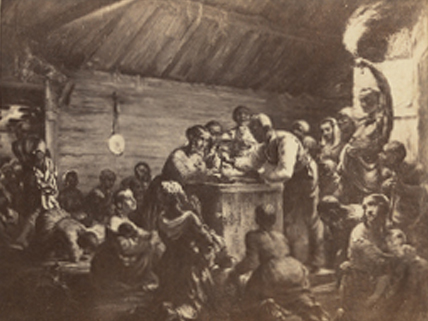African American men, women, and children count down the minutes on a watch before
the moment the Emancipation Proclamation is issued.
This year marks a milestone in Black history and U.S. history in general. One hundred and fifty years ago, on January 1, 1863, President Abraham Lincoln signed the Emancipation Proclamation. This significant decree freed all slaves in areas still in rebellion against the United States during the Civil War. The edict was not an act of Congress; instead, it was an order issued under Lincoln’s authority as commander in chief of the armed forces.
What did the Emancipation Proclamation do? The very day it went into effect, up to 50,000 slaves were freed. It allowed freedmen to join the Union army; some 200,000 ex-slaves would serve in the army during the war. As the Union army won more territory, an additional 3 million slaves were set free. These ex-slaves had been working in the fields, forges, factories, and mines that supported the South’s economy; the loss of their labor weakened the Confederacy. In areas still under Confederate control, the very news of the Proclamation inspired thousands of slaves to escape to Union lines, where they would be emancipated. In the North, abolitionists were inspired to work harder for the complete end of slavery.
The Proclamation also had an impact internationally. Because Great Britain was a vital trading partner for the South, the Confederacy had hoped that it would extend official recognition. But the British had abolished slavery in their own empire, and the Proclamation assured them that Lincoln wanted to end slavery eventually. In France, Italy, and other European countries, leaders applauded Lincoln’s bold move.
The Proclamation is often viewed as an immensely powerful document that changed the world overnight, but its reach was actually limited. The Proclamation did not make slavery illegal. Nor did it free every slave within the United States or the Confederacy. Various exemptions left hundreds of thousands of people still enslaved. In fact, slavery was still legal in Delaware and Kentucky until December 18, 1965, when the Thirteenth Amendment went into effect. Nor was the Proclamation universally popular in the North. For example, Copperheads viewed it as an invitation for ex-slaves to commit atrocities against white people. Its limits notwithstanding, the Emancipation Proclamation was a pivotal document that warrants celebration on its 150th anniversary.
Image credit: Library of Congress, Prints and Photographs Division
Related Links
-
Emancipation Proclamation
Get the basics and links to details here.
(Source: Encyclopaedia Britannica; accessed January 31, 2013) -
Chronology of Emancipation during the Civil War
Track important dates related to emancipation on this time line.
(Source: Freedmen & Southern Society Project; accessed January 31, 2013) -
Featured Documents: The Emancipation Proclamation
View photos of the original handwritten Proclamation at this website.
(Source: National Archives and Records Administration; accessed January 31, 2013) -
News from the Library of Congress
The Library of Congress has put Lincoln’s first draft of the Proclamation on display.
(Source: Library of Congress; accessed January 31, 2013) -
The Emancipation Proclamation: Freedom’s First Steps
For teachers, here is a complete lesson plan on the Proclamation, with classroom resources.
(Source: National Endowment for the Humanities; accessed January 31, 2013)





Nice job, it